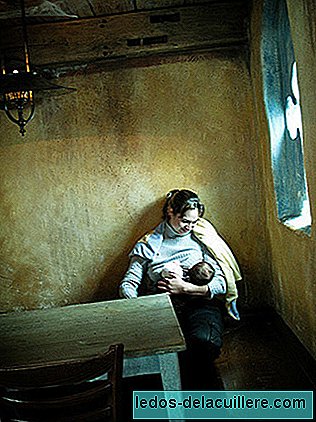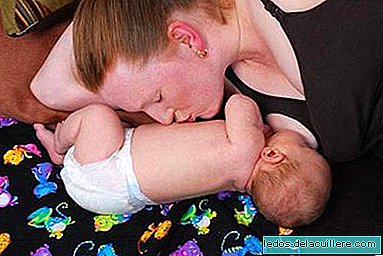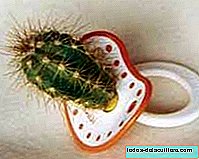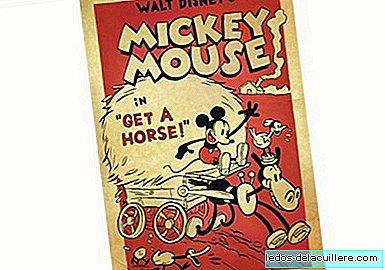
For several years thousands of breastfeeding women have suffered in their flesh not being able to take practically medicines because of breastfeeding. In fact, there are still those who go to the doctor's house with a sad recipe for paracetamol or with a "come back when you have weaned", because of the widespread nature of the myth about breastfeeding that says "if you breastfeed you can not take almost medication".
Luckily, many mothers are already informed that it is a myth and are able to explain to the doctors the medications they can take. It is sad, many doctors even resent them ("what do you say, that you have read it on the internet?"), But it is the only option if they want to be able to deal with a problem or illness with a medicine that doctors who do not know about breastfeeding They will not prescribe.
FDA will change drug leaflets
One of the biggest problems for mothers is that many drug prospects talk about "Pregnancy and Lactation", when one thing has nothing to do with the other. During a pregnancy the transfer of a medicine to the baby is direct. What the mother takes, the baby takes. That is why during pregnancy you have to watch a lot to take and always assess the cost and benefit of drinking something.
During breastfeeding, on the other hand, what the mother takes does not happen to the baby in the same way. The mother takes a medication, goes to her stomach, is absorbed by the body, some in large quantities and others in minute quantities, passes into the blood, milk, the baby takes the milk, it passes into her stomach, that digests it, and the drug molecule is absorbed to pass into the baby's blood.
Throughout this process there are medications that don't even reach the baby, and others that arrive in such a small amount that it is absurd not to give it to the mother. Others, on the other hand, do arrive in large numbers and can be dangerous, but they are a minority and, precisely because of this, it is necessary for prospects to change.
In U.S.A. They are about to make that change. At the request of a report by the American Academy of Pediatric, the Food and Drug Administration (FDA) plans to change the labeling of drugs so that there is a section entitled "Breastfeeding" in which mothers and professionals can read detailed information on the transfer of a medicine to breast milk and what is the potential risk to the baby. To do this, manufacturers will be forced to do studies with their drugs to know how they can affect breastfeeding.
Lactmed and E-lactation
To try to help doctors prescribe medications to nursing mothers, it was created in the USA. a database, administered by the National Library of Medicine, called Lactmed. In it any doctor and anyone, as mothers can also access, can search for a medicine and read the related information to know if it is suitable or not for a nursing mother.
In Spain we have E-lactation, a website created by the Marina Alta Hospital, which has the same informative function for mothers and doctors, which mothers always turn to when they go to the doctor: "Look, please, if I can take this medication in e-lactation"Many doctors make use of it, for the good of mothers, and many others resist, I suppose out of pride (or fear or insecurity), harming a mother more or less seriously: It is not the same that they do not give you something for the headache, that they do not give you something for tuberculosis or depression, or an allergic reaction, as happened to Mama (against) current.
Other ways to know if a baby can drink

Doctors have these tools at their disposal, but they also have other very useful tools that they can use: science and logic. Doctors are people of science, and they are experts in applying logic, so by combining both things they may be able to know whether or not a woman can take a medication. Each drug has certain characteristics (molecular weight, degree of plasma protein binding, maximum concentration time, etc.), which say, without studies, if a woman who breastfeeds can take a medicine or not (well, it does not work for all drugs, of course, but in some things it is very clear).
These data are useful when a specific drug does not appear in the listings of the databases mentioned above, or if you do not have access to them. We must then look for the characteristics of the drugs and apply the logic. Molecules with a very large size cannot pass into milk, so no matter how much a woman takes that drug, nothing will happen to the baby. Similarly, it is necessary to take into account how much of that drug passes into the blood, when it reaches the maximum concentration, when it stops working, how much the mother is going to take, for how long, etc.
Apart from these factors there are two that help, and a lot, and that have nothing to do with the drug: the age of the baby and if it is a medicine that babies also take. It is not the same to give a medication to a mother who breastfeeds a one-week-old baby as to a mother who breastfeeds an 18-month-old child. The first feeds exclusively on milk and is only one week old (weighs little and there are drugs that could affect it a lot) and the second feeds on milk and a thousand other things (milk is not its main food), and also weighs and a few kilos, so the same amount of a drug that could affect the baby, he could not do anything.
The other thing to keep in mind is that many of the medications that are prescribed to mothers are also taken by babies. Imagine a mother's face when they say "do not take ibuprofen, better paracetamol" and your child gives ibuprofen for fever. Or "I can't give you amoxicillin if you don't wean it" and then it turns out that in the baby's first otitis, with 2 months, they give him amoxicillin.
In short, it is a myth
The Lactating women can take almost any drug. Now only the doctors need to know so you don't have to end up happening what many mothers do and we have already explained sometime in the blog: lying. Many mothers go to the doctor, explain what happens to them and omit the fact that they are breastfeeding a baby.
Then they go with the prescription of the consultation, turn on the mobile, look in e-lactation if they can take it and, in case of not being compatible with breastfeeding, they go back and explain to the doctor that they have forgotten to say that they breastfeed , and what to see if you can prescribe the drug "x", they know they can take it.
At that time they cross their fingers to see if they are lucky enough to find a person who knows about the subject or with enough professionalism to, not knowing, look for information for the good of the mother and for the good of the baby.












